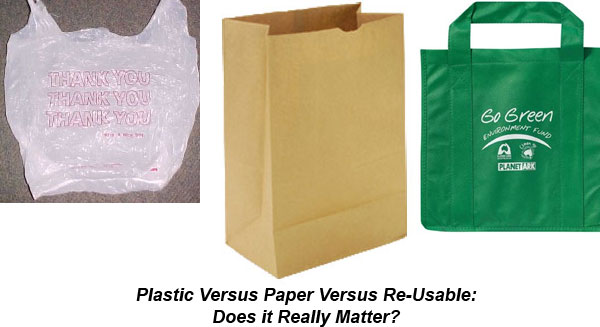New York Times columnist Thomas Friedman, in his new book Hot, Flat, and Crowded 2.0: Why We Need a Green Revolution--and How It Can Renew America, stirred up a bit the debate on the types shopping bags used in grocery and other retail outlets when he looked fondly at China’s ability to mandate the supposed Green reforms the authoritarian government chooses.
China, it turns out, officially banned the use of plastic bags in 2008.
“Bam! Just like that — 1.3 billion people, theoretically, will stop using thin plastic bags,” Friedman wrote. “Millions of barrels of petroleum will be saved, and mountains of garbage avoided.”
Well, not quite. It does not appear that China is really enforcing the measure, and perhaps the biggest question is: is the alternative to plastic bags really better?
A number of US cities, from San Francisco to Westport, CT have passed laws that ban plastic bags from use in by retailers in their jurisdictions It will take a lot more cities doing the same to make much of an impact – some 100 billion “t-shirt bags,” as the most common variety are called, are used every year in the US.
Estimates are that plastic bags account for 80% of the total for bags used in US grocery and convenience store channels. While some grocery chains continue to offer the “paper or plastic?” option, many, such as WalMart, now provide only the lower cost plastic bag option (plastic bags cost about 1 cent each, versus 4-5 cents for paper bags). WalMart, however, has a goal of reducing plastic bag usage by 33% in its stores over the next few years.
In addition to the action at the city level, some retailers, such as Whole Foods and IKEA, have stopped offering plastic bags altogether.
Globally, Ireland has placed a 20-cent tax on each plastic bag used, in addition to China’s nominal ban.
The driver of such legislation is the notion that because they are they are thought to be made from petroleum-based plastic, the t-shirt bags must be less environmentally friendly than the once ubiquitous paper bag.
But is that true?
According to The Film and Bag Federation, a trade group within the Society of the Plastics Industry based in Washington, D.C., the most environmentally friendly choice between paper or plastic bags is clearly plastic.
Compared to paper grocery bags, plastic grocery bags consume 40 percent less energy, generate 80 percent less solid waste, produce 70 percent fewer atmospheric emissions, and release up to 94 percent fewer waterborne wastes.
Two decades ago, a study by the US Federal Office of the Environment found that paper sacks generate 70% more air and 50 times more water pollutants than plastic bags.
In addition, it turns out that the vast majority of the polyethylene used to produce t-shirt bags is not made from oil-based sources at all, but rather natural gas – a much more abundant and cleaner resource of which the US has vast reserves.
Paper bags also require the felling of trees, another environmental no-no today. However, a positive for paper bags is that they will readily decompose in landfills (if not encased in a plastic trash bag), versus the many years it takes a plastic bag to degrade. Paper bags also probably get recycled at somewhat higher rates than plastic bags, that vast majority of which end up in the trash.
So, the case for banning plastic bags is questionable at best and perhaps actually the obviously bad environmental choice versus the feel-good paper bag option.
Will Re-Usable Bags Really Catch On?
Of course to environmentalist, the right choice between paper and plastic is neither – it’s the use of re-usable bags.
Widespread adoption of re-usable bags would save retailers money, and (it appears) be the most environmentally friendly option. A growing list of retailers are pushing re-usable bags at point-of-sale, often touting that the bags are themselves made of recycled materials. Year-over-year growth of recycled bags has been strong for several years, but there are issues with this alternative as well.
The first is that even if consumers buy the re-usable bags, they are rarely used thereafter.
A study two years ago by a television station in San Francisco found that 58% of consumers who had purchased re-usable bags almost never used them when shopping. Some estimates put the usage rates as low as just 10%.

It can take decades for consumers to change long-engrained habits, experts note.
Moreover, most of the re-usable bags sold in retail are now made in China and are themselves made of plastic, sometime using recycled plastics, sometime not. (Staples, for example, sells re-usable bags that are made of 30% recycled plastic, but most on sale today do not use recycled materials).
But the non-woven polypropylene plastic frequently used to produce the re-usable bags is itself an energy hog, using 28 times as much energy as is required to produce a standard t-shirt bag. While these re-usable bags can be used hundreds or times, if they are purchased and not regularly used, they are actually a clear environmental detriment.
Add to that news from a recent study from the University of Arizona that found that reusable shopping bags are breeding grounds for E. coli and other dangerous bacteria. Roughly 50 percent of the bags inspected were found to contain dangerous, potentially lethal, bacteria.
So what’s the net of all this? From our view, it’s that the environmental lobby should push the grocery bag issue to the back burner versus other opportunities.
What’s your take on the plastic versus paper versus re-usable issue? Is this something that really isn’t deserving of the attention it received? Let us know your thoughts at the Feedback button below.

TheGreenSupplyChain.com is now Twittering! Follow us at www.twitter.com/greenscm
|